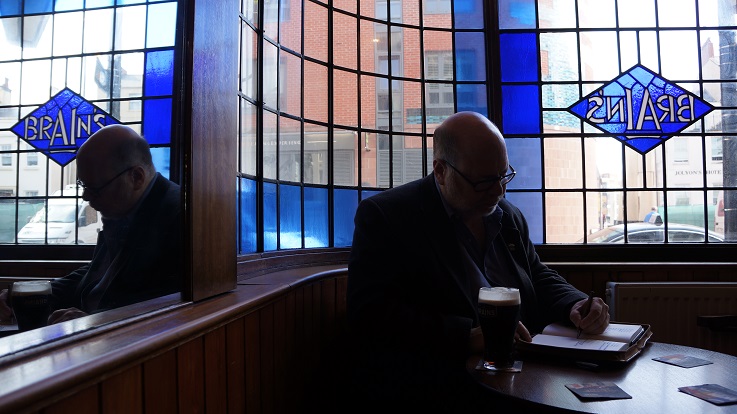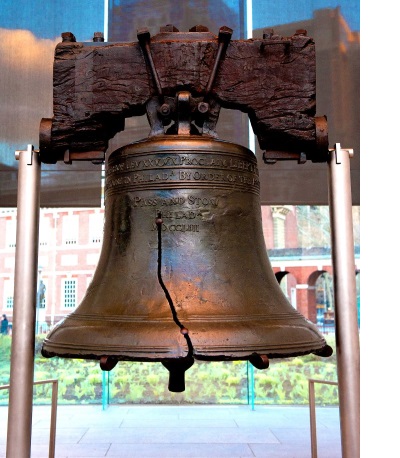 |
66. Philadelphia Contemplations
I am in Philadelphia so Ms Keogh, my cherished companion, can receive medical attention, and we have been in the USA for five months, soon to be six.
I have mixed feelings about Philadelphia. I do like many of the buildings individually, but there is a lingering depression stuck to this city. Too many of the streets are too narrow. That was fine when colonial homes were three and four stories tall, but the skyscrapers of Center City block out the sun and many new ones are being built
It is a city of homebodies. There is little street-life, except for the rowdies on South Street. There is visible poverty everywhere and much of the city seems fortified against an enlarged criminal element. Nice developments quickly fall into disrepair. Too many citizens are given to vandalism or indifference. Most everyone seems disappointed or angry. I know there are little theaters and private libraries tucked away throughout Center City, but they remain hidden, as if Philadelphians can't have good things. They are not trusted, will likely spoil it. Upscale stores feel obliged to stay away from downtown. There is a big gap between wealthy and poor in this city and they don't mix. It is not a happy place.
There is, however, a part of Philadelphia by the Delaware River in which there remains an array of colonial homes. This is a part of Philadelphia that I enjoy. Here some of the young nation's oldest buildings have been preserved, including many of its first public buildings. It is best to visit in spring when the multitude of small gardens are in bloom and a visitor can zigzag along redbrick lanes that pass beside blossoming backyards. I would probably like Philadelphia more, if I didn’t miss Cardiff which I love most of all.
During my forced sojourn in Philadelphia, I have been revisiting some historical sites. At Benjamin Franklin’s grave I paid my respects. He is one of my heroes. The cemetery was locked when I visited, despite the claim of hours on the placard. Still, the redbrick wall gives way to wrought iron railing where Ben's simple grave comes near to the sidewalk. There are plaques on the wall. One of them quoted the French finance minister Turgot’s apt description: “He tore from the skies the lightning and from tyrants the scepter.” [I later sought the original Latin, “Eripuit coelo fulmen sceptrumque tyrannis.”]
As I stood by his grave contemplating Ben’s humanity, I was approached by a Buddhist monk – at least in appearance. Nice fellow, but he had only enough English to wish me a peaceful life. I wished him a peaceful life. He picked me out of a crowd of five who had stopped at Franklin's grave. The others were reading the signs and plaques, while I was recording thoughts into my little notebook. He gave me the gift of a gold amulet, that is, he gave me a plastic card with a gold coating. "Kai guang." What he wanted was a donation, but I only gave him my calling card. It carried no other information than my engraved name. He didn't know what to make of it, but I was every bit as insistent that he should keep my card as he had been that I should keep his amulet. While I suspected he was looking for donations, I didn’t realize at the time that these fake monks are spreading their scam to many cities and have been denounced by the Buddhist clerics for diverting donations away from real monks.
I also revisited Independence Hall, the cradle of my country, because inside the Assembly Room of this Georgian-style, redbrick building was born the Declaration of Independence. Eleven years later, in the same room, behind thick curtains to maintain secrecy despite hot summer days, a gathering of minds educated by the Enlightenment hammered together the Constitution that defines my homeland. You would believe this sanctum would be the mecca for any American patriot. This last visit, early in the morning, my fellow pilgrims were mostly immigrants and foreigners.
When I visited Independence Hall as a child, the Liberty Bell still resided in the Tower Stair Hall and we were free to touch it. Few of my fellow citizens can ever tell you why the Liberty Bell is so named. In fact, it was originally the State House Bell, because Independence Hall was formerly the Pennsylvania State House. The word “liberty” appears on the Bell as part of a quotation from Leviticus 25:10, “… and proclaim liberty throughout all the land unto all the inhabitants thereof ….” But the Bell received its name from the Abolitionists who used its image as a frontispiece for Liberty, a pre-Civil War publication of the New York Anti-Slavery Society. Indeed, the Bell’s famous crack symbolized a nation marred by slavery. The Bell is now parked in its own building across the street and cannot be touched, only viewed.

Independence Hall, listed as a World Heritage Site, resides at the southern end of Independence Mall. The mall is a grassy space extending three blocks and lined with museums and exhibition galleries. This is the Independence National Historical Park and, like other National Parks, it has some park rangers sporting Smokey-the-Bear hats.
The park rangers are a valuable asset to the visitor. They clearly love their work and have an in-depth knowledge of the Nation’s history and its iconography. They welcome questions.
I had originally intended to visit the National Constitution Center at the Mall’s northern end, but it turns out they charge an admission fee of $14.50. That didn't feel right. Shouldn't I have free access to the museum about my Constitution? Doesn't our Republic depend on an enlightened citizenry? I never did understand the ridiculous concept that ignorance of the law is no excuse. Of course it is an excuse, especially when the law is concealed from us and couched in esoteric jargon. Besides, the Constitution doesn’t reside there. It is housed in the National Archives Museum in Washington DC where there is no admission fee.
I am not one of those Americans who pay lip service to the Constitution without ever having read it. I have read it. I have even read James Madison’s notes describing the debates that crafted the supreme laws of the USA, clearly a secular endeavor of brilliance that resulted in compromises to allow future development.
The spirit of Thomas Paine yet pulses through the arteries of many Americans. The temporary apartment we have rented is nine stories above Chestnut Street, two blocks west of Independence Hall. Recently, a brass band had parked itself on Chestnut Street below my bedroom window. Maybe, if it just passed by, I might have slept through it, incorporating it into my dreams, but it persisted. The brass instruments were accompanied by cheers and chants. It was another protest march against everything Trump and Republican. I couldn’t see the narrow street below without hanging out the sealed window, so I hurriedly dressed and went down to see the protest up close. I walked along side it for the couple of blocks, as far as Independence Hall. Then I just watched and listened, proud and encouraged.
An attractive young woman with ginger hair, perhaps forty years younger than me, popped out of the march to tell me she loved me. It was an incongruous remark and I could not understand why she targeted me. I asked her why, but she spoke some combination of New Age and liberal political babble I didn’t understand. I think she mistook me for the opposition and was trying to convert what she imagined was my point of view with her good looks and attention. I laughed and said thank you.
Conversation with a Park Guard at the Independence National Historical Park:
me – Are you instructed not to take political sides, not to express a political position?
Park Ranger – Yes.
me – Are you ever embarrassed by the ignorance of citizens about the Constitution?
PR – It can be very disturbing.
me – I am trying very carefully to not ask you a question you shouldn’t answer.
PR – [laughs]
me – Everything about this place stands in resistance to our latest President.
PR – It does.
me – He’s probably never been here and would never come.
PR – He is something different for this country.
me – The National Park Service must be very concerned about him, but then I would never ask.
PR – We are, but then I would never answer.
![]()
Mr Bentzman will continue to report here regularly about
the events and concerns of his life. If you've any
comments or suggestions, he would be pleased to hear
from you.
Selected Suburban Soliloquies, the best of Mr Bentzman's earlier series of Snakeskin essays, is available as a book or as an ebook, from Amazon and elsewhere.
